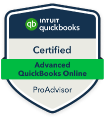
As a business owner, one of the best pieces of knowledge you can equip yourself with is one of the most critical parts of your business – the numbers! Understanding basic accounting concepts can help you take your business where you want it to go and help you make informed financial decisions. Business owners who are familiar with the fundamentals of accounting often have a better chance at sustainability, scalability, and security.
The Generally Accepted Accounting Principles (GAAP) is standard across US and Canada, however, some international countries use the International Financial Reporting Standards (IFRS). The 10 GAAP general concepts or principles include:
- Regularity – The GAAP rules are standard across the entire business and used by accounting staff.
- Consistency – The same standards are applied through each step of the reporting process with any difference disclosed.
- Sincerity – Business finances are reported accurately and objectively.
- Permanence – All financial reporting and procedures are consistent from report to report and across all accounting periods.
- Noncompensation – The concept that all accountants complete honest work without any compensation, regardless of positive or negative factors. Accountants do not get paid based on how good or bad the reporting turns out.
- Prudence. – All financial data is not infullenced by guesswork and are completed based on documented facts.
- Continuity – Data collection should not interrupt normal business operations.
- Periodicity – All financial data is reported within the corresponding and relevant accounting periods.
- Materiality – Accounting must disclose all material financial and accounting facts.
- Good Faith – Financial data collection and reporting are done with honesty and completeness.
Accounting principles are the rules and guidelines that accountants, companies, and other bodies must follow when reporting financial data. These standards make it easier to examine financial data and improve the quality of the information reported by businesses and individuals.
At Accounting By Sal, we follow the accounting principles to ensure accuracy and reliability. Our accounting and bookkeeping services in Canada and the USA are done by certified and professional accounting professionals with extensive experience using the latest business accounting software. In this article, we will cover some of the most foundational accounting prirnciples, including expanding on the GAAP concepts.
Fundamental accounting principles
1. Accrual
Accrual is one of the most critical concepts to know in accounting. Revenue or expenses are recorded when the transaction occurs, not when the payment is received or made. For example, you invoice a customer for services completed on January 15 with a 30-day payment timeframe. The payment arrives on February 15th. Based on accrual accounting, the income appears on January 15th versus February 15th. This method helps you identify expenses and trends in your business for strategic and management purposes.
2. Consistency
Much like the name implies, consistency simply means that once you choose an accounting method, you should stick with the same method for all future records. This not only allows you to accurately compare month-to-month or year-to-year performance, but it also minimizes confusion, makes for more organized books, and a smoother tax process.
3. Conservatism
Conservatism recognizes expenses and liabilities as soon as possible regardless of whether there is uncertainty, but recognizes revenue and assets when you’re sure it will be received. For example, if there is uncertainty about a potential loss, conservatism states that you should record the loss. However, if there is uncertainty about a gain, conservatism states that you should not record the gain.
4. Matching
This concept states that you should record related revenue and expenses at the same time to identify any cause-and-effect correlation between income and purchases. For example, recording the cost of a piece of equipment over its useful life to match the expense of the asset with the revenue it generates.
5. Materiality
Simply put, materiality states that businesses should record financial transactions that could materially impact business decisions, even if it’s a minor transaction. For example, recording a notebook for $10. Recording small expenses allows you to get a more comprehensive picture of your business. Modern accounting software and integrations help make this easier, as you can record these small expenses on the go and set up automated transactions if it’s a recurring expense.
6. Cost
The cost principle requires assets be recorded at the cash amount when the asset is acquired. For example, if you purchase equipment for $30,000 it should be recorded at $30,000, even if the equipment is financed with monthly payments on an interest rate.
7. Revenue Recognition
This concept is a feature of accrual accounting and requires that some revenue be recorded on the same income statement period when the revenue is earned, not when the cash is received. This recognizes the transaction as a receivable for your business and as a payable for the client.
8. Going Concern
The going concern concept states that you should assume your business is in good standing and will continue to operate for the foreseeable future. This allows you to defer certain transactions in future accounting periods when necessary. With this principles, businesses are not able to perform prepaid or accrued expenses.














